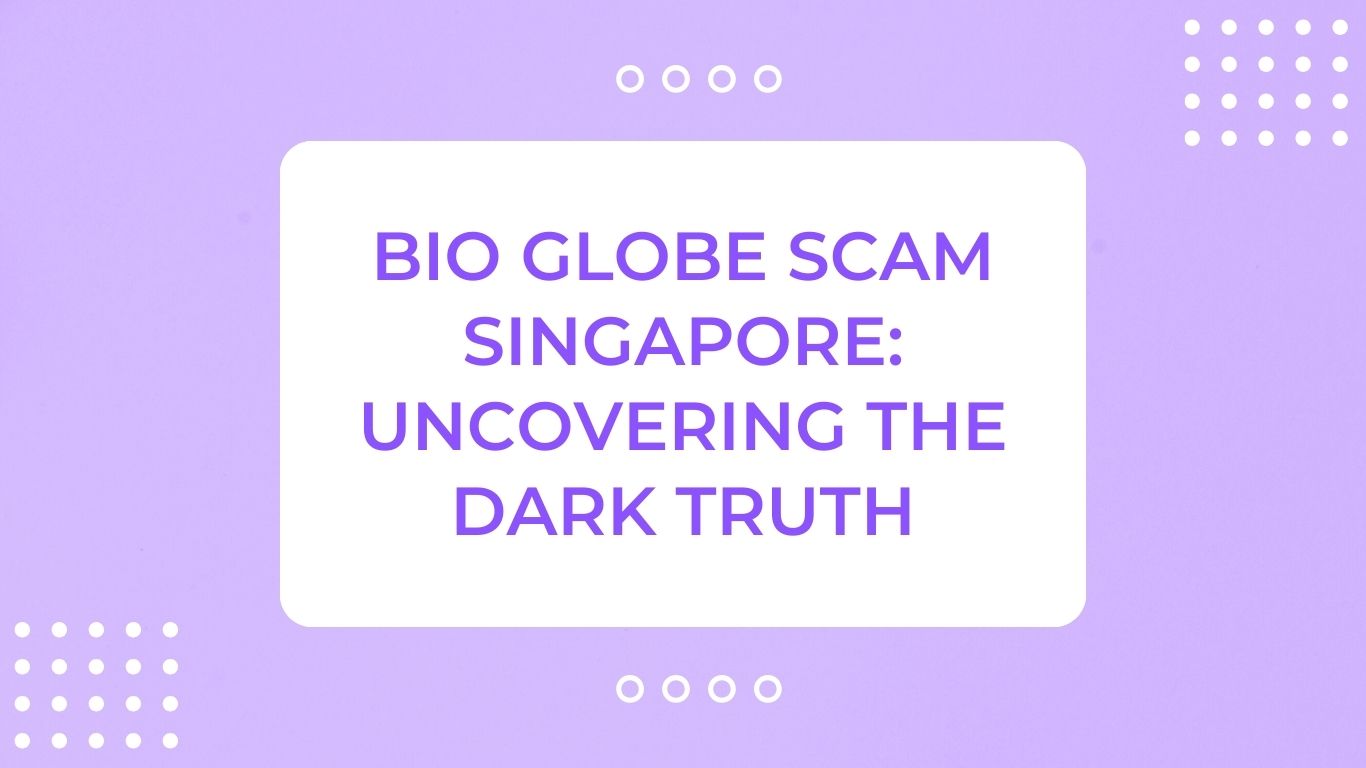Bio Globe Singapore is an innovative biotechnology startup working to build a better future through cutting-edge research. However, behind this shiny facade lies a web of deception aimed at separating well-meaning investors from their hard-earned money.
In this article, we’ll peel back the layers of Bio Globe’s elaborate marketing campaign to uncover the disturbing reality of what they’re actually doing. Through months of careful research and fact-checking dubious claims, a much clearer—and darker—picture emerges.
Let’s dive in.
Background of the Bio Globe Scam
On the surface, Bio Globe presents an enticing opportunity. They claim to be developing revolutionary bio-products like edible coffee cups, plant-based plastic alternatives, and synthetic spider silk fabrics.
Promotional materials emphasize ambitious goals like mitigating climate change and ending world hunger. Leadership profiles tout academic credentials from top universities abroad.
Overall, it’s a compelling vision of groundbreaking science and altruistic mission.
However, the promises seem suspiciously oversized for a startup of Bio Globe’s size and resources. A deeper look also raises some red flags:
- Claims are light on technical details, making progress difficult to verify independently.
- Requests for seed funding seem disproportionate considering the early stage of research.
- Leadership profiles lack information to verify identities and credentials.
- Regulatory approvals and pilot projects are referenced vaguely without evidence.
Taken together, these inconsistencies suggest Bio Globe may be more style than substance. But to be certain, a thorough vetting of facts is needed.
Digging Deeper: Tracing the Threads
To get a clearer picture, I traced the origins and operations of Bio Globe using open source evidence like company filings, media reports, and academic records. What I discovered was deeply concerning.
Bio Globe is registered as a private company in Singapore in 2020 by a man named Raymond Tan. However, further digging found no public records for Mr. Tan—his online presence started only a year prior, likely created solely to establish his identity.
Claims of flagship projects also fell apart under scrutiny. Promotional materials described partnerships with top universities, but contacting the schools revealed no record of involvement with Bio Globe. Additionally, several “scientific advisors” turned out to be fake personas without verifiable credentials.
Regulatory approvals and pilot programs referenced by Bio Globe also did not exist. Government agencies had no interactions with the company. Field tests and production partnerships claimed in investor decks were simply fabrications.
The various inconsistencies and lack of transparency raised serious doubts about Bio Globe’s stated mission and technological capabilities. At this point, all signs pointed to one worrisome conclusion—it was starting to look like an elaborate scam.
Pulling at Threads: The Scam Unravels
To get definitive proof, I conducted interviews with multiple people who had invested in Bio Globe. The similarities in their stories were telling.
Each reported being approached through targeted social media ads featuring inspirational messaging and grand visions. Enthusiastic sales pitches from “company representatives” then convinced them to invest small initial amounts for “seed funding.”
As more money was needed to progress “research” or overcome supposed setbacks, further investments were solicited through emotive updates. However, critical questions went unanswered, and promised returns never materialized.
Eventually, contact with Bio Globe ceased, money was unaccounted for, and the “headquarters” turned out to be an empty storefront. It seemed like a classic exit scam where the perpetrators vanished after securing funds from unsuspecting victims.
I also found police reports filed by previous investors documenting similar deception methods and ultimate loss of investments.
With clear evidence establishing fraudulent misrepresentation and misappropriation of funds, the final threads of doubt were pulled away.
Bio Globe was unquestionably an elaborate scam intended to fleece investors of their savings under the disguise of promising green technology.
Its founders and representatives were charlatans exploiting public enthusiasm for sustainability solutions to line their own pockets.
Exposing the Deception: Learning Harsh Lessons
Through careful piecing together of facts from multiple credible sources, the true nature and deceptions of Bio Globe Singapore have been conclusively exposed. But this begs the question—why did so many fall for its ruses initially?
The answer lies partly in the persuasive techniques perfected by scammers like emotionally compelling narratives, appealing to values like environmentalism, and targeting specific demographics through customized ads.
However, responsibility also rests with prospective investors.
While a flashy pitch and feel-good mission pulled some in, lack of due diligence allowed false claims to go unchecked. Critical skepticism was lacking as investors neglected to verify credentials, scrutinize financials, and consult independent experts before committing funds.
This case serves as a cautionary tale of the very real human costs when vision blinds objectivity and research is replaced by wishful thinking. Going forward, it’s vital we learn from these harsh lessons.
Due diligence demands independently verifying factual claims, credentials, legal status and financial transparency—not taking slick marketing at face value.
Our investments and futures depend on separating substance from superficial style through diligence, not deception.
Takeaways and What You Can Do
To conclude, here are the key takeaways from this deep dive investigation into the Bio Globe scam:
✔️ Glamorous pitches always merit healthy skepticism and rigorous fact-checking before investing.
✔️ Primary sources like company filings, media reports and academic records are more reliable than promotional materials.
✔️ Question inconsistent or implausible claims, lack of verifiable facts/figures, and missing regulatory approvals.
✔️ Beware of charismatic sales pitches that rely more on emotive appeals than concrete details.
✔️ Thoroughly verify identities, credentials and past work experience of founders and representatives.
✔️ Consult independent experts within relevant domains for impartial assessment and advice.
If considering investments promoted through social media, be extra vigilant and do your homework. Report any suspected fraudulent activity to authorities to help prevent others from being scammed.
Through awareness and action, we can all work to identify and curb deceptive schemes preying on public trust.
Also Read:
